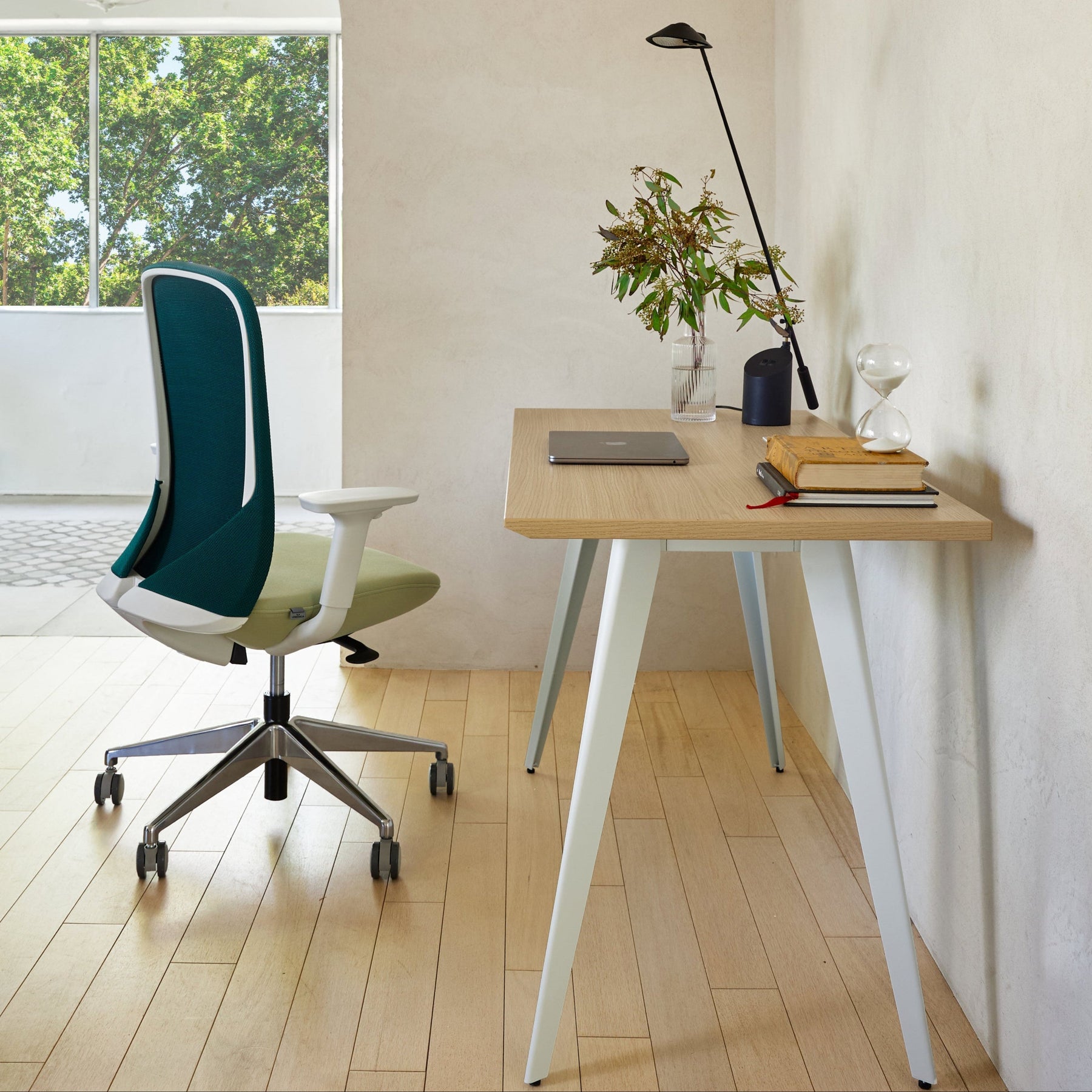Get 10% off your first order
Find the office furniture that’s designed to match your style, comfort, and needs perfectly. Subscribe
Standard Chair Height for Desk Setup Made Simple

Visit quiz page to see how we makes it easy to create an inspiring workplace

The market for ergonomic furniture has exploded in recent years as more people work from home and invest in health-focused office setups. Unfortunately, this demand has also led to an influx of fake or low-quality ergonomic chairs that claim to be supportive but lack the science and design behind true ergonomic seating.
Why does this matter? Sitting in a poorly designed chair for hours each day can lead to chronic back pain, muscle strain, poor posture, and reduced productivity. According to the CDC’s ergonomics research, improper workplace design and equipment directly contribute to musculoskeletal disorders, which can have long-term health consequences.
The bottom line: spotting a fake or poorly made ergonomic chair isn’t just about avoiding a bad purchase — it’s about protecting your health.

Spotting a subpar chair requires looking beyond flashy marketing. Here are the most common red flags:
One of the biggest giveaways of a fake ergonomic chair is the frame construction. Genuine chairs use strong steel or aluminum bases that can support long-term weight without wobbling. Low-quality chairs often disguise flimsy plastic parts with metallic paint or thin alloy coatings.
For example, the Ergonomic Novo Chair demonstrates what to look for: a durable steel base, smooth-glide casters, and high-load capacity.
Check the chair’s weight — if it feels unusually light, it may not have the steel reinforcement advertised.
Inspect joints and welds; poor chairs often use weak adhesives instead of bolts.
Look for peeling or chipped metallic paint that reveals plastic underneath.
A real ergonomic chair adapts to your body. At minimum, it should offer:
Seat height adjustment
Lumbar support adjustment
Armrest flexibility
Tilt and recline tension
Fake chairs often offer only basic tilt and height, locking you into one posture all day. Over time, this forces the spine and shoulders into unnatural positions, leading to discomfort.
Low-density foam that flattens within months is a dead giveaway of a cheaply made chair. Poorly stitched upholstery is another red flag — seams may fray or split under regular use.
By contrast, the Ergonomic Onyx Chair is built with high-density foam, breathable mesh, and precision stitching, ensuring both comfort and longevity.
Authentic ergonomic chairs typically meet standards such as:
BIFMA (Business and Institutional Furniture Manufacturers Association)
ANSI (American National Standards Institute)
ISO (International Organization for Standardization)
Counterfeit chairs often display misleading logos or certifications that don’t exist. Always check a brand’s website to confirm their testing credentials.
| Feature | Genuine Ergonomic Chair | Fake or Low-Quality Chair |
|---|---|---|
| Frame Material | Steel or aluminum, heavy-duty construction | Thin alloys or plastic painted as metal |
| Adjustment Range | Multi-point adjustability (height, lumbar, arms, tilt) | Limited to height and basic tilt |
| Cushion Quality | High-density foam, breathable fabric/mesh | Low-density foam, cheap vinyl or fabric |
| Certifications | BIFMA, ANSI, ISO compliance | Fake or unverifiable logos |
| Warranty | Multi-year (5–10 years standard) | Minimal or no warranty |
This side-by-side view makes it clear: the differences between genuine and fake ergonomic chairs are easy to spot once you know where to look.
If a chair is marketed as “premium ergonomic” but costs less than a meal for two, it’s likely too good to be true. Genuine ergonomic chairs require advanced engineering and durable materials — and that comes with a fair price. Be cautious of flash sales or “70% off today only” tactics.
Cheap manufacturers often lean on filler terms like “executive comfort” or “luxury feel” without providing technical details about lumbar support, tilt tension, or foam density.
By contrast, the Ergonomic Chair Collection provides detailed specifications so buyers can make informed choices.
Stock photos reused across multiple sellers are a red flag.
Look for lifestyle images showing the chair in real settings.
Zoom in on small details like stitching and casters — if photos are blurry, the seller may be hiding flaws.
Authentic sellers encourage detailed, verified reviews. Fake products often feature reviews that:
Repeat identical wording.
Use broken grammar or non-native phrasing.
Appear in bulk within a short timeframe.
Before buying, always read both the highest-rated and lowest-rated reviews to see patterns.
Even if you’re shopping online, testing in-store can be invaluable.
Sit in the chair and try:
Adjusting seat height.
Testing lumbar support for depth and firmness.
Moving armrests inward/outward.
Leaning back to check recline stability.
For enhanced customization, consider accessories like an ergonomic arm support to reduce shoulder strain.
Look at small details:
Stitching — tight and uniform, not loose or uneven.
Base stability — wiggle the chair; it shouldn’t sway.
Wheel smoothness — casters should roll without resistance.
These small checks can quickly reveal if a chair is built to last or destined for the landfill.
Use this quick checklist when shopping in-store or online:
✅ Perform a weight test — heavier frames are usually genuine.
✅ Look for certifications (BIFMA, ANSI, ISO).
✅ Test the range of adjustability (more is better).
✅ Press into the cushion — quality foam regains shape quickly.
✅ Verify the warranty and return policy — reliable brands stand behind their products.

The rise of remote and hybrid work has permanently blurred the line between office and home furniture. More people are investing in ergonomic setups, but with this surge comes more counterfeit and low-quality products.
Choosing a genuine ergonomic chair is more than a purchase, it’s an investment in long-term health, comfort, and productivity. As technology advances, future chairs may feature smart posture sensors, adaptive lumbar systems, and sustainable materials.
But one thing will remain the same: the need to spot the difference between authentic ergonomic solutions and cheap imitations. Armed with the right knowledge, you’ll know exactly how to spot a fake or low-quality ergonomic chair, and avoid wasting money on furniture that fails you.
A fake ergonomic chair usually has poor build quality, minimal adjustability, and lacks verified certifications. If a chair feels lightweight, has only basic tilt and height adjustments, and offers no warranty, it’s likely low-quality.
Fake or poorly designed chairs fail to support the spine’s natural curve. Without proper lumbar and seat adjustments, users are forced into unhealthy positions that can lead to back pain, muscle fatigue, and long-term posture problems.
Look for BIFMA, ANSI, or ISO certifications. These confirm the chair has passed durability, safety, and ergonomic testing. If certifications are missing or unverifiable, the chair is likely not truly ergonomic.
Sit in the chair and test the adjustability of the seat, lumbar support, and armrests. Press into the cushion to check foam density, and inspect the frame for stability. A genuine ergonomic chair should feel stable, supportive, and customizable.
Not necessarily. Some affordable chairs provide decent support, but extremely cheap models that claim “luxury ergonomic” features are usually misleading. The key is to verify certifications, adjustability, and build quality before purchasing.

Standard Chair Height for Desk Setup Made Simple

Ergonomic Computer Stand Ideas for Better Alignment

Most Comfortable Inexpensive Office Chair Features
Get 10% off your first order
Find the office furniture that’s designed to match your style, comfort, and needs perfectly. Subscribe
Leave a comment